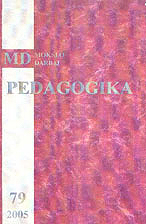Specialiųjų ugdymo(si) poreikių turinčio vaiko vertinimo kontroversijos: įvertinimas ar nuvertinimas?
Controversy of Assessment of the Child with Special Educational Needs: Evaluation or Devaluation
Author(s): Algirdas AlišauskasSubject(s): Education
Published by: Vytauto Didžiojo Universitetas
Keywords: child; special educational needs; evaluation; devaluation.
Summary/Abstract: The investigation represented in the article has been focused on two major issues: a) the analysis of methodological attitudes as well as the content used by Pedagogical Psychological Service (PPS) in the process of pedagogical psychological assessment of the of children with special educational needs; b) the evaluation of Pedagogical Psychological Service professionals’ activity in terms of realisation of methodological approach. In the investigation the content analysis of documents (275 conclusions of assessment of students have been analysed in all) of Pedagogical Psychological Service have been used and semi-standardised questionnaire in written has been applied. Professionals from 22 Pedagogical Psychological Services took part in the investigation. They have been asked to full fill in the questionnaires regarding their functions, principles of the activity and priorities applied. The results of the investigation showed, that the importance of the idea of social participation and involvement has been recognised and declared by the professionals. However the priorities defined and used by professionals of PPS, diverge with the paradigm of social interaction and they are adverse to the quality of social involvement and social participation. PPS professionals are much more focused on clinical/deficit model used in the process of assessment of children with special educational needs. The main focus on theoretical norm as well as features of disorder while assessing children has been prevailed. The depreciatory and negative characteristics of the individual have been dominated and seeking for finding out direct links between the special educational needs of the child and the nature of disorder have been evident. The difficulties experienced by the child used to be related with the personal characteristics of the child rather than educational environment. Professionals indicating the barriers for the optimal activity in PPS used to focus on external factors: lack of finance, poor material facilities, difficulties using transports etc. The lack of orientation towards the internal recourses and their development is common for the professionals. The lack of skills, competencies and knowledge has never mentioned by the professionals, though the professional competence as the main quality for the functioning in PPS has been emphasised. Seeking for the higher quality of functioning of PPS it is important to induce the efficient using of human resources as well as applying the methodological principles of social interaction in the process of assessment of the child. The priority of PPS activity needs to be shifted from the assessment of disability of the child towards the systemic evaluation of disabling situation (needs and competencies of all participants of educational process) as well as towards the focus on recommendation/consultation- based information.
Journal: Pedagogika
- Issue Year: 2005
- Issue No: 79
- Page Range: 161-166
- Page Count: 6
- Language: Lithuanian

